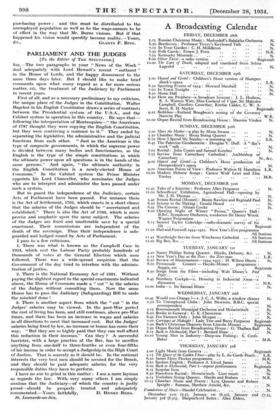PARLIAMENT AND THE JUDGES
[To the Editor of THE SPECTATOR.] SIR,-The two paragraphs in your " News of the Week " deal adequately with Lord Hewart's recent " outburst " in the House of Lords, and the happy denouement to the same three days later. But I should like to make brief comments upon what many regard as a far more serious matter, viz, the treatment of the Judiciary by Parliament in recent years. , First of all, and as a necessary preliminary to my criticism, the unique place of the Judges in the Constitution. Walter Bagehot in his English Constitution draws a series of contrasts between the Presidential system of the U.S.A:, and the Cabinet system in operation in this country. He says that- folloWing the interpretation of Montesquieu--" the Americans of 1787 thought they were copying the English Constitution, but they were contriving a contrast to.lt." They ended by separating the legislative, the administrative and the judicial functions from each other. " Just as the American is the type of composite governments, in which the supreme power is divided between many bodies and functionaries, so the English is the type of -the simple constitutions in which the ultimate 'power upon all questions is in the hands of the same persons." And again, " the ultimate authority in the English Constitution is a newly-elected House of Commons." In the Cabinet system. the Prime Minister appoints his Lord Chancellor, who nominates the Judges who are to interpret and administer the laws passed under such a system.
But to guard the independence of the Judiciary, certain Acts of Parliament have been passed. For instance there is the Act of Settlement, 1701, which enacts in a short clause that the salaries of the Judges should be " ascertained and established." There is also the Act of 1760, which is more precise and emphatic upon the same subject. The salaries of the Judges are fixed and unalterable save by a special enactment. Their commissions are independent of the death of the sovereign. Thus their independence is safe- guarded and hedged round by Acts of Parliament.
I pass to a few criticisms.
1. There was what is known as the Campbell Case in 1924, which cost the Labour Party probably hundreds of thousands of votes at the General Election which soon followed. There was a wide-spread suspicion that the Government of the day tried to interfere with the adminis- tration of justice.
2. There is the National Economy Act of 1931. Without paying the slightest regard to the special enactments indicated above, the House of Commons made a " cut " in the salaries of the Judges ,without consulting them. Now the same House has to pass the Judiciary (Safeguarding) Bill to undo the mischief done 3. There is another aspect from which the " cut " in the Judges' salaries may be viewed. In the post-War period the cost of living has been, and still continues, above pre-War times, and there has been an increase in wages and salaries in all directions to meet that increased cost. But the Judges' salaries being fixed by law, no increase or bonus has come their way. "But they are so highly paid that they can well afford this reduction in their incomes." Can they ? A successful barrister, with a large practice at the Bar, has to sacrifice anything from one-half, to three-fourths or even four-fifths of his income in order to accept a Judgeship in the High Court of Justice. That is scarcely as it should be. In the national interests the very best men should be secured for the Bench, and they should be paid adequate salaries for the very responsible duties they have to perform.
I have no axe to grind in this matter : I am a mere layman as regards the law. With-very many others I am simply anxious that the Judiciary-of which the country is justly proud-should be properly treated and adequately remunerated.-Yours faithfully, D. HENRY REES. St. Leonards-on-Sea.


































 Previous page
Previous page